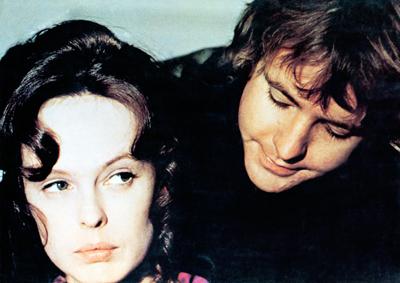"This film began Robert Altman's 1970s effort to experiment with established movie genres: in this case, the Gothic thriller." -- New York Times
"Sandy Dennis is strikingly effective." -- Variety
That Cold Day in the Park (1969)
By 1969, Robert Altman was a prolific director of episodic television, craving a transition to feature filmmaking, but facing a steep climb toward his goal. His first few feature outings (the 1957 independent feature The Delinquents, a documentary about James Dean from the same year, and the 1968 space thriller Countdown), had not sufficiently captured the imaginations of audiences or the film industry to sustain a feature career.
That Cold Day in the Park represented a daring gambit in this context: quiet and cryptic, it displayed Altman’s iconoclastic fascinations: a sensitivity to schisms within normalcy, a fascination with female subjectivity, and the construction of atmospheres as expressive of psychological states. Sandy Dennis portrays Frances Austen, a young spinster who occupies a well-appointed apartment in Vancouver. There she listlessly entertains a suitor several years her senior, and engages in rote domestic routines. From her window one day, Frances spies a young man (Michael Burns) on a park bench outside, visibly cold and wet. Inviting him inside, she shows the handsome stranger, who is apparently mute, every hospitality—food, clothes, profuse conversation, and a room of his own. Little does she realize that her charming, receptive listener has a complex life of his own, to which he escapes nightly through his bedroom window. The stage is set for conflict as Frances’ loneliness takes on a ferocity that drives the story to a harrowing conclusion.
Altman draws a fascinating, restrained performance from the famously mannered Sandy Dennis. Her Frances seems related to other troubled women in contemporaneous films, by the likes of Roman Polanski and even Alfred Hitchcock (for whom Altman had directed television episodes). But Frances may also be said to represent a general bourgeois type to whom comforts and social rituals represent suffocating dead ends—in contrast to glimpses of the boy’s unconventional outer life, or the tawdry streets and underground lesbian bars that Frances trolls before the story is over.
Par for the course, the film was received with ambivalence and disdain by many critics, and did not meet with commercial success; hardly the calling card that Altman needed. However, fate brought M*A*S*H (1970) and great fame to Altman soon afterward, while That Cold Day in the Park has gathered admirers over time, particularly among those who recognize in it a first flowering of its director’s unique gift.
Shannon Kelley
Factor-Altman-Mirell Films/ Commonwealth United Entertainment, Inc. Producers: Donald Factor and Leon Mirell. Director: Robert Altman. Screenwriter: Gillian Freeman. Based on the novel by Peter Miles. Cinematographer: Laszlo Kovacs. Editor: Danford B. Greene. With: Sandy Dennis, Michael Burns, Susanne Benton, Luana Anders, John Garfield Jr.
35mm, color, 112 min.
Preserved in cooperation with Paramount Pictures from the 35mm acetate original picture and track negatives, and a 35mm magnetic track. Laboratory services by YCM Laboratories, Audio Mechanics, DJ Audio.






 Mobile Navigation
Mobile Navigation

